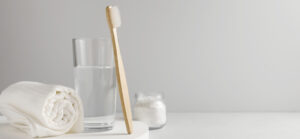【歯ブラシのかたさ】

一般的に歯ブラシは「かため・ふつう・やわらかめ」の3種類が販売されていますが、歯茎が弱っていなければ「ふつう」をお勧めします。「やわらかめ」を使っている場合でも、丁寧な歯磨きで歯茎が引き締まってきて、出血などがなければ「ふつう」に替えると良いでしょう。
「やわらかめ」は歯垢が落ちにくいため、歯茎のマッサージというイメージで使ってみてください。歯茎をマッサージすると血行が良くなり、酸素や栄養が歯茎の中にいきわたります。そうすると細胞の入れ替わりが正常に行われるので、歯肉炎などで痛んだ歯茎の修復が促されたり、歯周病菌への抵抗力が付きます。また、口腔内が刺激され唾液の分泌が促されるので口臭予防や、自浄作用で虫歯予防にもなります。日常に取り入れられるケアですので、ぜひやってみてください。その際はやわらかめの歯ブラシを使い、歯茎を傷めないように気を付けて行ってください。
Toothbrush Hardness
There are typically 3 types of bristle hardness for toothbrushes that are available at stores: soft, medium, and hard bristles. Our recommendation would be to use a medium bristle toothbrush, except for those with weakened gums. For those using a soft bristle toothbrush, with careful brushing, your gums will eventually become firmer and will have the tendency to bleed less. At that point it is recommended to switch to a medium bristle toothbrush.
Soft bristle brushes are best utilized to massage the gums. Massaging the gums improves blood circulation, which then brings oxygen and nutrients into your gums. This allows cells to regenerate and repair gums that are damaged due to gingivitis and increases resistance to periodontal disease. In addition, it also stimulates the oral cavity and promotes saliva secretion, which then prevents bad breath and has a self-cleaning effect which prevents cavities. This type of care can be incorporated into your daily dental routine, so please give it a try. When doing so, be sure to use a soft bristle toothbrush and be careful not to damage your gums.






